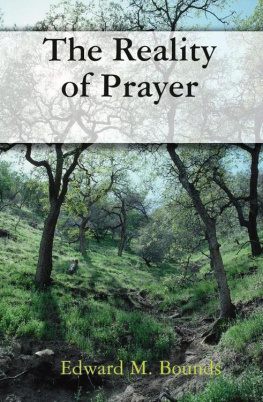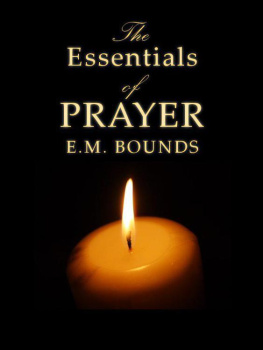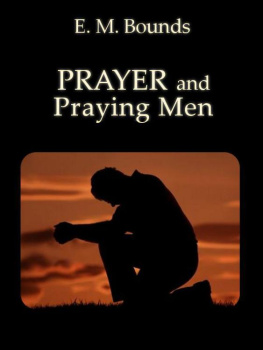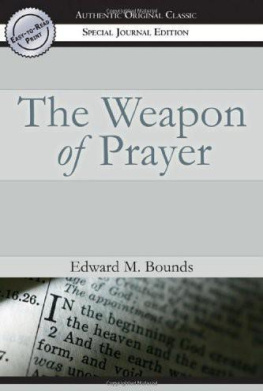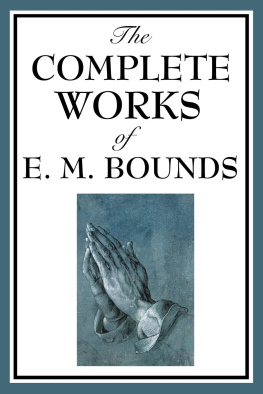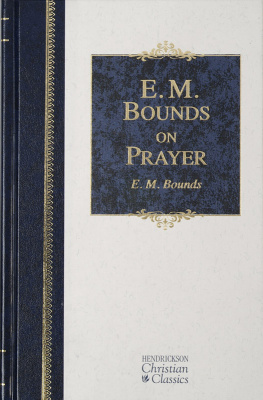The Reality of Prayer Edward M. Bounds About the Author

Edward McKendree Bounds (August 15, 1835 August 24, 1913) was a clergyman of the Methodist Episcopal Church South and author of eleven books, nine of which focused on the subject of prayer.Only two of Bounds' books were published before he died. After his death, Rev. Claudius (Claude) Lysias Chilton, Jr., grandson of William Parish Chilton and admirer of Bounds, worked on preserving and preparing Bounds' collection of manuscripts for publication. By 1921 more editorial work was being done by Rev. Homer W. Hodge.Chilton said of his books:These books are unfailing wells for a lifetime of spiritual water-drawing.They are hidden treasures, wrought in the darkness of dawn and the heat of the noon, on the anvil of experience,and beaten into wondrous form by the mighty stroke of the divine. They are living voices whereby he, being dead, yet speaketh! Nonfiction
- Power Through Prayer
- Prayer and Praying Men
- Purpose in Prayer
- The Essentials of Prayer
- The Necessity of Prayer
- The Possibilities of Prayer
- The Reality of Prayer
- The Weapon of Prayer
- Preacher and Prayer
- Satan: His Personality, Power and Overthrow
- Heaven: A Place - A City - A Home
Source: Wikipedia FOREWORD During the last 25 years of the nineteenth century and a score of years of the twentieth, there lived and died three great men of God whom I knewmen whom God has doubtless numbered among the foremost of His heavenly host. The first was Edward McKendree Bounds, author of this present volume and the other "Spiritual Life" Books. The second was Claud L. Chilton, minister for many years in the Methodist Episcopal Church, South, and a musical composer of religious music of considerable note. The third, Clement C. Cary, preacher and editor, lost his life in an automobile accident in 1922. The fourth was Dr. B. F. Haynes, minister, editor and author, who died in Nashville, in 1923.What Dr. Thomas Goodwin, the Puritan, was to Strong, Arrowsmith and Sparstow; what John Wesley was to Whitefield, Fletcher and Clark, Bounds was to Chilton, Cary and Haynes. What David Brainerd's Journal did for Cary, Martyn, McCheyne, Bounds' books can do for thousands of God's children. He was a man who lived ever on prayer ground. He walked and talked with the Lord. Prayer was the great weapon in his arsenal, his pathway to the Throne of Grace. None who read what he has written can fail of realising that Edward McKendree Bounds talked with God, as a man talketh to his friend.Homer W. Hodge Flushing, N.Y. I. PRAYERA PRIVILEGE, PRINCELY, SACRED I am the creature of a day, passing through life as an arrow through the air. I am a spirit come from God and returning to God; just hovering over the great gulf; till a few moments hence I am no more seen; I drop into an unchangeable eternity! I want to know one thing, the way to heaven; how to land safe on that happy shore. God Himself has condescended to teach the way; for this end He came from heaven. He hath written it down in a book. give me that book! At any price give me the Book of God! Lord, is it not Thy word"If any man lack wisdom, let him ask of God? Thou givest liberally, and upbraidest not. Thou hast said, if any be willing to do Thy will he shall know. I am willing to do; let me know Thy will." John WesleyThe word "Prayer" expresses the largest and most comprehensive approach unto God. It gives prominence to the element of devotion. It is communion and intercourse with God. It is enjoyment of God. It is access to God. "Supplication" is a more restricted and more intense form of prayer, accompanied by a sense of personal need, limited to the seeking in an urgent manner of a supply for pressing need."Supplication" is the very soul of prayer in the way of pleading for some one thing, greatly needed, and the need intensely felt."Intercession" is an enlargement in prayer, a going out in broadness and fullness from self to others. Primarily, it does not centre in praying for others, but refers to the freeness, boldness and childlike confidence of the praying. It is the fullness of confiding influence in the soul's approach to God, unlimited and unhesitating in its access and its demands. This influence and confident trust is to be used for others.Prayer always, and everywhere is an immediate and confiding approach to, and a request of, God the Father. In the prayer universal and perfect, as the pattern of all praying, it is "Our Father, Who art in Heaven." At the grave of Lazarus, Jesus lifted up His eyes and said, "Father." In His sacerdotal prayer, Jesus lifted up His eyes to Heaven, and said, "Father." Personal, familiar and paternal was all His praying. Strong, tool and touching and tearful, was His praying. Read these words of Paul: "Who in the days of his flesh, when he had offered up prayers and supplications, with strong crying and tears, unto him that was able to save him from death, and was heard in that he feared" (Hebrews 5:7).So elsewhere (James 1:5) we have "asking" set forth as prayer: "If any of you lack wisdom, let him ask of God, who giveth to all men liberally, and upbraideth not, and it shall be given him.""Asking of God" and "receiving" from the Lorddirect application to God, immediate connection with Godthat is prayer.In John 5:13 we have this statement about prayer: "And this is the confidence that we have in him, that if we ask anything according to his will, he heareth us. And if we know that he heareth us, whatsoever we ask, we know that we have the petitions that we desired of him." In Phil. 4:6 we have these words about prayer: "Be careful for nothing, but in everything, by prayer and supplication, with thanksgiving, let your requests be made known unto God." What is God's will about prayer? First of all, it is God's will that we pray. Jesus Christ "spake a parable unto them to this end, that men ought always to pray, and not to faint"Paul writes to young Timothy about the first things which God's people are to do, and first among the first he puts prayer: "I exhort, therefore, that first of all, supplications, prayers, intercessions, and giving of thanks, be made for all men" (1 Tim. 2:1).In connection with these words Paul declares that the will of God and the redemption and mediation of Jesus Christ for the salvation for all men are all vitally concerned in this matter of prayer. In this his apostolical authority and solicitude of soul conspire with God's will and Christ's intercession to will that "the men pray everywhere."Note how frequently prayer is brought forward in the New Testament: "Continuing instant in prayer"; "Pray without ceasing"; "Continue in prayer, and watch in the same with thanksgiving"; "Be ye sober and watch unto prayer"; Christ's clarion call was "watch and pray." What are all these and others, if it is not the will of God that men should pray?Prayer is complement, make efficient and cooperate with God's will, whose sovereign sway is to run parallel in extent and power with the atonement of Jesus Christ. He, through the Eternal Spirit, by the grace of God, "tasted death for every man." We, through the Eternal Spirit, by the grace of God, pray for every man.But how do I know that I am praying by the will of God? Every true attempt to pray is in response to the will of God. Bungling it may be and untutored by human teachers, but it is accept-able to God, because it is in obedience to His will. If I will give myself up to the inspiration of the Spirit of God, who commands me to pray, the details and the petitions of that praying will all fall into harmony with the will of Him who wills that I should pray.Prayer is no little thing, no selfish and small matter. It does not concern the petty interests of one person. The littlest prayer broadens out by the will of God till it touches all words, conserves all interests, and enhances man's greatest wealth, and God's greatest good. God is so concerned that men pray that He has promised to answer prayer. He has not promised to do something general if we pray, but He has promised to do the very thing for which we pray.Prayer, as taught by Jesus in its essential features, enters into all the relations of life. It sanctifies brotherliness. To the Jew, the altar was the symbol and place of prayer. The Jew devoted the altar to the worship of God. Jesus Christ takes the altar of prayer and devotes it to the worship of the brotherhood. How Christ purifies the altar and enlarges it! How He takes it out of the sphere of a mere performance, and makes its virtue to consist, not in the mere act of praying, but in the spirit which actuates us toward men. Our spirit toward folks is of the life of prayer. We must be at peace with men, and, if possible, have them at peace with us, before we can be at peace with God. Reconciliation with men is the forerunner of reconciliation with God. Our spirit and words must embrace men before they can embrace God. Unity with the brotherhood goes before unity with God. "Therefore, if thou bring thy gift to the altar, and there rememberest that thy brother hath aught against thee; leave there thy gift before the altar, and go thy way. First, be reconciled to thy brother, and then come and offer thy gift" (Matthew 5:23).Non-praying is lawlessness, discord, anarchy. Prayer, in the moral government of God, is as strong and far-reaching as the law of gravitation in the material world, and it is as necessary as gravitation to hold things in their proper sphere and in life.The space occupied by prayer in the Sermon on the Mount bespeaks its estimate by Christ and the importance it holds in His system. Many important principles are discussed in a verse or two. The Sermon consists of one hundred and eleven verses, and eighteen are about prayer directly, and others indirectly.Prayer was one of the cardinal principles of piety in every dispensation and to every child of God. It did not pertain to the business of Christ to originate duties, but to recover, to recast, to spiritualise, and to reinforce those duties which are cardinal and original.With Moses the great features of prayer are prominent. He never beats the air nor fights a sham battle. The most serious and strenuous business of his serious and strenuous life was prayer. He is much at it with the intensest earnestness of his soul. Intimate as he was with God, his intimacy did not abate the necessity of prayer. This intimacy only brought clearer insight into the nature and necessity of prayer, and led him to see the greater obligations to pray, and to discover the larger results of praying. In reviewing one of the crises through which Israel passed, when the very existence of the nation was imperilled, he writes: "I fell down before the Lord forty days and forty nights." Wonderful praying and wonderful results! Moses knew how to do wonderful praying, and God knew how to give wonderful results.The whole force of Bible statement is to increase our faith in the doctrine that prayer affects God, secures favors from God, which can be secured in no other way, and which will not be bestowed by God if we do not pray. The whole canon of Bible teaching is to illustrate the great truth that God hears and answers prayer. One of the great purposes of God in His book is to impress upon us indelibly the great importance, the priceless value, and the absolute necessity of asking God for the things which we need for time and eternity. He urges us by every consideration, and presses and warns us by every interest. He points us to His own Son, turned over to us for our good, as His pledge that prayer will be answered, teaching us that God is our Father, able to do all things for us and to give all things to us, much more than earthly parents are able or willing to do for their children.Let us thoroughly understand ourselves and understand, also, this great business of prayer. Our one great business is prayer, and we will never do it well without we fasten to it by all binding force. We will never do it well without arranging the best conditions of doing it well. Satan has suffered so much by good praying that all his wily, shrewd and ensnaring devices will be used to cripple its performances.We must, by all the fastenings we can find, cable ourselves to prayer. To be loose in time and place is to open the door to Satan. To be exact, prompt, unswerving, and careful in even the little things, is to buttress ourselves against the Evil One.Prayer, by God's very oath, is put in the very stones of God's foundations, as eternal as its companion, "And men shall pray for him continually." This is the eternal condition which advances His cause, and makes it powerfully aggressive. Men are to always pray for it. Its strength, beauty and aggression lie in their prayers. Its power lies simply in its power to pray. No power is found elsewhere but in its ability to pray. "For my house shall be called the house of prayer for all people." It is based on prayer, and carried on by the same means.Prayer is a privilege, a sacred, princely privilege. Prayer is a duty, an obligation most binding, and most imperative, which should hold us to it. But prayer is more than a privilege, more than a duty. It is a means, an instrument, a condition. Not to pray is to lose much more than to fail in the exercise and enjoyment of a high, or sweet privilege. Not to pray is to fail along lines far more important than even the violation of an obligation.Prayer is the appointed condition of getting God's aid. This aid is as manifold and illimitable as God's ability, and as varied and exhaustless is this aid as man's need. Prayer is the avenue through which God supplies man's wants. Prayer is the channel through which all good flows from God to man, and all good from men to men. God is the Christian's father. Asking and giving are in that relation.Man is the one more immediately concerned in this great work of praying. It ennobles man's reason to employ it in prayer. The office and work of prayer is the divinest engagement of man's reason. Prayer makes man's reason to shine. Intelligence of the highest order approves prayer. He is the wisest man who prays the most and the best. Prayer is the school of wisdom as well as of piety.Prayer is not a picture to handle, to admire, to look at. It is not beauty, coloring, shape, attitude, imagination, or genius. These things do not pertain to its character or conduct. It is not poetry nor music. Its inspiration and melody come from Heaven. Prayer belongs to the spirit, and at times it possesses the spirit and stirs the spirit with high and holy purposes and resolves. II. PRAYERFILLS MAN'S POVERTY WITH GOD'S RICHES For two hours I struggled on, forsaken of God, and met neither God nor man, all one chilly afternoon. When at last, standing still and looking at Schiehallion clothed in white from top to bottom, this of David shot up into my heart: "Wash me, and I shall be whiter than snow!" In a moment I was with God, or rather God was with me. I walked home with my heart in a flame of fire. Alexander Whyte, D.D.We have much fine writing and learned talk about the subjective benefits of prayer; how prayer secures its full measure of results, not by affecting God, but by affecting us, by becoming a training school for those who pray. We are taught by such teachers that the province of prayer is not to get, but to train. Prayer thus becomes a mere performance, a drill-sergeant, a school, in which patience, tranquility and dependence are taught. In this school, denial of prayer is the most valuable teacher. How well all this may look, and how reasonable soever it may seem, there is nothing of it in the Bible. The clear and oftrepeated language of the Bible is that prayer is to be answered by God; that God occupies the relation of a father to us, and that as Father He gives to us when we ask the things for which we ask. The best praying, therefore, is the praying that gets an answer.The possibilities and necessity of prayer are graven in the eternal foundations of the Gospel. The relation that is established between the Father and the Son and the decreed covenant between the two, has prayer as the base of its existence, and the conditions of the advance and success of the Gospel. Prayer is the condition by which all foes are to be overcome and all the inheritance is to be possessed.These are axiomatic truths, though they may be very homely ones. But these are the times when Bible axioms need to be stressed, pressed, iterated and reiterated. The very air is rife with influences, practices and theories which sap foundations, and the most veritable truths and the most self-evident axioms go down by insidious and invisible attacks.More than this: the tendency of these times is to an ostentatious parade of doing, which enfeebles the life and dissipates the spirit of praying. There may be kneeling, and there may be standing in prayerful attitude. There may be much bowing of the head, and yet there may be no serious, real praying. Prayer is real work. Praying is vital work. Prayer has in its keeping the very heart of worship. There may be the exhibit, the circumstance, and the pomp of praying, and yet no real praying. There may be much attitude, gesture, and verbiage, but no praying.Who can approach into God's presence in prayer? Who can come before the great God, Maker of all worlds, the God and Father of our Lord Jesus Christ, who holds in His hands all good, and who is all powerful and able to do all things? Man's approach to this great Godwhat lowliness, what truth, what cleanness of hands, and purity of heart is needed and demanded!Definition of prayer scarcely belongs to Bible range at any point. Everywhere we are impressed that it is more important and urgent that men pray, than that they be skilled in the homiletic didactics of prayer. That is a thing of the heart, not of the schools. It is more of feeling than of words. Praying is the best school in which to learn to pray, prayer the best dictionary to define the art and nature of praying.We repeat and reiterate. Prayer is not a mere habit, riveted by custom and memory, something which must be gone through with, its value depending upon the decency and perfection of the performance. Prayer is not a duty which must be performed, to ease obligation and to quiet conscience. Prayer is not mere privilege, a sacred indulgence to be taken advantage of, at leisure, at pleasure, at will, and no serious loss attending its omission.Prayer is a solemn service due to God, an adoration, a worship, an approach to God for some request, the presenting of some desire, the expression of some need to Him, who supplies all need, and who satisfies all desires; who, as a Father, finds His greatest pleasure in relieving the wants and granting the desires of His children. Prayer is the child's request, not to the winds nor to the world, but to the Father. Prayer is the outstretched arms of the child for the Father's help. Prayer is the child's cry calling to the Father's ear, the Father's heart, and to the Father's ability, which the Father is to hear, the Father is to feel, and which the Father is to relieve. Prayer is the seeking of God's great and greatest good, which will not come if we do not pray.Prayer is an ardent and believing cry to God for some specific thing. God's rule is to answer by giving the specific thing asked for. With it may come much of other gifts and graces. Strength, serenity, sweetness, and faith may come as the bearers of the gifts. But even they come because God hears and answers prayer.We do but follow the plain letter and spirit of the Bible when we affirm that God answers prayer, and answers by giving us the very things we desire, and that the withholding of that which we desire and the giving of something else is not the rule, but rare and exceptional. When His children cry for bread He gives them bread.Revelation does not deal in philosophical subtleties, nor verbal niceties and hair-splitting distinctions. It unfolds relationships, declares principles, and enforces duties. The heart must define, the experience must realise. Paul came on the stage too late to define prayer. That which had been so well done by patriarchs and prophets needed no return to dictionaries. Christ is Himself the illustration and definition of prayer. He prayed as man had never prayed. He put prayer on a higher basis, with grander results and simpler being than it had ever known. He taught Paul how to pray by the revelation of Himself, which is the first call to prayer, and the first lesson in praying. Prayer, like love, is too ethereal and too heavenly to be held in the gross arms of chilly definitions. It belongs to Heaven, and to the heart, and not to words and ideas only.Prayer is no petty invention of man, a fancied relief for fancied ills. Prayer is no dreary performance, dead and death-dealing, but is God's enabling act for man, living and life-giving, joy and joy-giving. Prayer is the contact of a living soul with God. In prayer, God stoops to kiss man, to bless man, and to aid man in everything that God can devise or man can need. Prayer fills man's emptiness with God's fullness. It fills man's poverty with God's riches. It puts away man's weakness with God's strength. It banishes man's littleness with God's greatness. Prayer is God's plan to supply man's great and continuous need with God's great and continuous abundance.What is this prayer to which men are called? It is not a mere form, a child's play. It is serious, difficult work, the manliest, the mightiest work, the divinest work which man can do. Prayer lifts men out of the earthliness and links them with the heavenly. Men are never nearer Heaven, nearer God, never more God-like, never in deeper sympathy and truer partnership with Jesus Christ, than when praying. Love, philanthropy, holy affiances,all of them helpful and tender for menare born and perfected by prayer.Prayer is not merely a question of duty, but of salvation. Are men saved who are not men of prayer? Is not the gift, the inclination, the habit of prayer, one of the elements or characteristics of salvation? Can it be possible to be in affinity with Jesus Christ and not be prayerful? Is it possible to have the Holy Spirit and not have the spirit of prayer? Can one have the new birth and not be born to prayer? Is not the life of the Spirit and the life of prayer coordinate and consistent? Can brotherly love be in the heart which is unschooled in prayer?We have two kinds of prayer named in the New Testamentprayer and supplication. Prayer denotes prayer in general. Supplication is a more intense and more special form of prayer. These two, supplication and prayer, ought to be combined. Then we would have devotion in its widest and sweetest form, and supplication with its most earnest and personal sense of need.In Paul's Prayer Directory, found in Ephes. 6, we are taught to be always in prayer, as we are always in the battle. The Holy Spirit is to be sought by intense supplication, and our supplications are to be charged by His vitalising, illuminating and ennobling energy. Watchfulness is to fit us for this intense praying and intense fighting. Perseverance is an essential element in successful praying, as in every other realm of conflict. The saints universal are to be helped on to victory by the aid of our prayers. Apostolic courage, ability and success are to be gained by the prayers of the soldier saints everywhere.It is only those of deep and true vision who can administer prayer. These "Living Creatures," in Rev. 4:6, are described as "full of eyes before and behind," "full of eyes within." Eyes are for seeing. Clearness, intensity,[ ]and perfection of sight are in it. Vigilance and profound insight are in it, the faculty of knowing. It is by prayer that the eyes of our hearts are opened. Clear, profound knowledge of the mysteries of grace is secured by prayer. These "Living Creatures" had eyes "within and without" They were "full of eyes." The highest form of life is intelligent. Ignorance is degrading and low, in the spiritual realm as it is in other realms. Prayer gives us eyes to see God. Prayer is seeing God. The prayer life is knowledge without and within. All vigilance without, all vigilance within. There can be no intelligent prayer without knowledge within. Our inner condition and our inner needs must be felt and known.It takes prayer to minister. It takes life, the highest form of life, to minister. Prayer is the highest intelligence, the profoundest wisdom, the most vital, the most joyous, the most efficacious, the most powerful of all vocations. It is life, radiant, transporting, eternal life. Away with dry forms, with dead, cold habits of prayer! Away with sterile routine, with senseless performances and petty playthings in prayer! Let us get at the serious work, the chief business of men, that of prayer. Let us work at it skillfully. Let us seek to be adepts in this great work of praying. Let us be master-workmen, in this high art of praying. Let us be so in the habit of prayer, so devoted to prayer, so filled with its rich spices, so ardent by its holy flame, that all Heaven and earth will be perfumed by its aroma, and nations yet in the womb will be blest by our prayers. Heaven will be fuller and brighter in glorious inhabitants, earth will be better prepared for its bridal day, and hell robbed of many of its victims, because we have lived to pray.There is not only a sad and ruinous neglect of any attempt to pray, but there is an immense waste in the seeming praying which is done, as official praying, state praying, mere habit praying. Men cleave to the form and semblance of a thing after the heart and reality have gone out of it. This finds illustrations in many who seem to pray. Formal praying has a strong hold and a strong following.Hannah's statement to Eli and her defense against his charge of hypocrisy was: "I have poured out my soul before the Lord." God's serious promise to the Jews was, "Then shall ye call upon me, and ye shall go and pray unto me, and I will hearken unto you. And ye shall seek me and find me when ye shall search for me with all your heart."Let all the present day praying be measured by these standards "Pouring out the soul before God," and "Seeking with all the heart," and how much of it will be found to be mere form, waste, worthless. James says of Elijah that he "prayed with prayer."In Paul's directions to Timothy about prayer, (1 Tim. 1:8) we have a comprehensive verbal description of prayer in its different departments, or varied manifestations. They are all in the plural form, supplications, prayers and intercessions. They declare the many-sidedness, the endless diversity, and the necessity of going beyond the formal simplicity of a single prayer, and press and add prayer upon prayer, supplication to supplication, intercession over and over again, until the combined force of prayers in their most superlative modes, unite their aggregation and pressure with cumulative power to our praying. The unlimited superlative and the unlimited plural are the only measures of prayer. The one term of "prayer" is the common and comprehensive one for the act, the duty, the spirit, and the service we call prayer. It is the condensed statement of worship. The heavenly worship does not have the element of prayer so conspicuous. Prayer is the conspicuous, all-important essence and the all-colouring ingredient of earthly worship, while praise is the pre-eminent, comprehensive, all-colouring, all-inspiring element of the heavenly worship. III. PRAYERTHE ALL-IMPORTANT ESSENCE OF EARTHLY WORSHIP Where the spiritual consciousness is concernedthe department which asks the question and demands the evidenceno evidence is competent or relevant except such as is spiritual. Only that which is above matter and above logic can be heard, because the very question at issue is the existence and personality of a spiritual and supernatural God. Only the Spirit himself beareth witness with our spirit. This must be done in a spiritual or supernatural way, or it cannot be done at all. C.L. ChiltonThe Jewish law and the prophets know something of God as a Father. Occasional and imperfect, yet comforting glimpses they had of the great truth of God's Fatherhood, and of our sonship. Christ lays the foundation of prayer deep and strong with this basic principle. The law of prayer, the right to pray, rests on sonship. "Our Father" brings us into the closest relationship to God. Prayer is the child's approach, the child's plea, the child's right. It is the law of prayer that looks up, that lifts up the eye to "Our Father, Who art in Heaven." Our Father's house is our home in Heaven. Heavenly citizenship and heavenly homesickness are in prayer; Prayer is an appeal from the lowness, from the emptiness, from the need of earth, to the highness, the fullness and to the all-sufficiency of Heaven. Prayer turns the eye and the heart heavenward with a child's longings, a child's trust and a child's expectancy. To hallow God's Name, to speak it with bated breath, to hold it sacredly, this also belongs to prayer.In this connection it might be said that it is requisite to dictate to children the necessity of prayer in order to their salvation. But alas! Unhappily it is thought sufficient to tell them there is a Heaven and a hell; that they must avoid the latter place and seek to reach the former. Yet they are not taught the easiest way to arrive at salvation. The only way to Heaven is by the route of prayer, such prayer of the heart which every one is capable of. It is prayer, not of reasonings which are the fruits of study, or of the exercise of the imagination, which fills the mind with wondering objects, but which fails to settle salvation, but the simple, confidential prayer of the child to his Father in Heaven.Poverty of spirit enters into true praying. "Blessed are the poor in spirit, for theirs is the kingdom of Heaven." "The poor" means paupers, beggars, those who live on the bounties of others, who live by begging. Christ's people live by asking. "Prayer is the Christian's vital breath." It is his affluent inheritance, his daily annuity.In His own example, Christ illustrates the nature and necessity of prayer. Everywhere He declares that he who is on God's mission in this world will pray. He is an illustrious example of the principle that the more devoted the man is to God, the more prayerful will he be. The diviner the man, the more of the Spirit of the Father and of the Son he has, the more prayerful will he be. And, conversely, it is true that the more prayerful he is, the more of the Spirit of the Father and of the Son will he receive.The great events and crowning periods of the life of Jesus we find Him in prayerat the beginning of His ministry, at the fords of the Jordan, when the Holy Spirit descended upon Him; just prior to the transfiguration, and in the garden of Gethsemane. Well do the words of Peter come in here: "Leaving us an example that ye should follow His steps."There is an important principle of prayer found in some of the miracles of Christ. It is the progressive nature of the answer to prayer. Not at once does God always give the full answer to prayer, but rather progressively, step by step. Mark 8:22 describes a case which illustrates this important truth, too often overlooked. "And he cometh to Bethsaida; and they bring a blind man unto him, and besought him to touch him. "And he took the blind man by the hand, and led him out of the town; and when he had spit on his eyes, and put His hands upon him, he asked him if he saw aught. "And he looked up, and said, I see men as trees, walking.' "After that he put his hands again upon his eyes, and made him look up; and he was restored, and saw every man clearly." Alone He has to take us at times, aside from the world, where He can have us all to Himself, and there speak to and deal with us.We have three cures in blindness in the life of our Lord, which illustrate the nature of God's working in answering prayer, and show the exhaustless variety and the omnipotence of His working.In the first case Christ came incidentally on a blind man at Jerusalem, made clay, softened it by spittle, and smeared it on the eyes and then commanded the man to go and wash in the pool of Siloam. The gracious results lay at the end of his actionwashing. The failure to go and wash would have been fatal to the cure. No one, not even the blind man, in this instance, requested the cure.In the second case the parties who bring the blind man, back their bringing with earnest prayer for cure; they beseech Christ to simply touch him, as though their faith would relieve the burden of a heavy operation. But He took the man by the hand and led him out of the town and apart from the people. Alone, and in secret, this work was to be done. He spat on his eyes and put his hands on them. The response was not complete, a dawning of light, a partial recovery; the first gracious communication but gave him a disordered vision, the second stroke perfected the cure. The man's submissive faith in giving himself up to Christ to be led away into privacy and alone, were prominent features of the cure, as also the gradual reception of sight, and the necessity of a second stroke to finish the perfect work.The third was the case of blind Bartimus. It was the urgency of faith declaring itself in clamourous utterances, rebuked by those who were following Christ, but intensified and emboldened by opposition.The first case comes on Christ unawares; the second was brought with specific intent to Him; the last goes after Christ with irresistible urgency, met by the resistance of the multitude and the seeming indifference of Christ. The cure, though, was without the interposition of any agent, no taking by the hand, no gentle or severe touch, no spittle, nor clay, nor washinga word only and his sight, full-orbed, came instantly. Each one had experienced the same divine power, the same blessed results, but with marked diversity in the expression of their faith and the mode of their cure. Suppose, at their meeting, the first had set up the particulars and process of his cure, the spittle, the clay, the washing in Siloam as the only Divine process, as the only genuine credentials of a Divine work, how far from the truth, how narrow and misleading such a standard of decision! Not methods, but results, are the tests of the Divine work.Each one could say: "This one thing I know, whereas I was blind I now see." The results were conscious results; that Christ did the work they knew; faith was the instrument, but its exercise different; the method of Christ's working different; the various steps that brought them to the gracious end on their part and on His part at many points strikingly dissimilar.What are the limitations of prayer? How far do its benefits and possibilities reach? What part of God's dealing with man, and with man's world, is unaffected by prayer? Do the possibilities of prayer cover all temporal and spiritual good? The answers to these questions are of transcendental importance. The answer will gauge the effort and results of our praying. The answer will greatly enhance the value of prayer, or will greatly depress prayer. The answer to these important questions are fully covered by Paul's words on prayer: "Be careful for nothing, but in everything, by prayer and supplication, with thanksgiving, let your requests be made known unto God" (Phil. 4:6). IV. GOD HAS EVERYTHING TO DO WITH PRAYER Christ is all. We are complete in Him. He is the answer to every need, the perfect Savior. He needs no decoration to heighten His beauty, no prop to increase His stability, no girding to perfect His strength. Who can gild refined gold, whiten the snow, perfume the rose or heighten the colors of the summer sunset? Who will prop the mountains or help the great deep? It is not Christ and philosophy, nor Christ and money, nor civilization, nor diplomacy, nor science, nor organisation. It is Christ alone. He trod the winepress alone. His own arm brought salvation. He is enough. He is the comfort, the strength, the wisdom, the righteousness, the sanctification of all man. C. L. Chilton.Prayer is God's business to which men can attend. Prayer is God's necessary business, which men only can do, and that men must do. Men who belong to God are obliged to pray. They are not obliged to grow rich, nor to make money. They are not obliged to have large success in business. These are incidental, occasional, merely nominal, as far as integrity to Heaven and loyalty to God are concerned. Material successes are immaterial to God. Men are neither better nor worse with those things or without them. They are not sources of reputation nor elements of character in the heavenly estimates. But to pray, to really pray, is the source of revenue, the basis of reputation, and the element of character in the estimation of God. Men are obliged to pray as they are obliged to be religious. Prayer is loyalty to God. Non-praying is to reject Christ and to abandon Heaven. A life of prayer is the only life which Heaven counts.God is vitally concerned that men should pray. Men are bettered by prayer, and the world is bettered by praying. God does His best work for the world through prayer. God's greatest glory and man's highest good are secured by prayer. Prayer forms the godliest men and makes the godliest world.God's promises lie like giant corpses without life, only for decay and dust unless men appropriate and vivify these promises by earnest and prevailing prayer.Promise is like the unsown seed, the germ of life in it, but the soil and culture of prayer are necessary to germinate and culture the seed. Prayer is God's life-giving breath. God's purposes move along the pathway made by prayer to their glorious designs. God's purposes are always moving to their high and benignant ends, but the movement is along the way marked by unceasing prayer. The breath of prayer in man is from God.God has everything to do with prayer, as well as everything to do with the one who prays. To him who prays, and as he prays, the hour is sacred because it is God's hour. The occasion is sacred because it is the occasion of the soul's approach to God, and of dealing with God. No hour is more hallowed because it is the occasion of the soul's mightiest approach to God, and of the fullest revelation from God. Men are Godlike and men are blessed, just as the hour of prayer has the most of God in it. Prayer makes and measures the approach of God. He knows not God who knows not how to pray. He has never seen God whose eye has not been couched for God in the closet. God's vision place is the closet. His dwelling place is in secret. "He that dwelleth in the secret place of the most High shall abide under the shadow of the Almighty."He has never studied God who has not had his intellect broadened, strengthened, clarified and uplifted by prayer. Almighty God commands prayer, God waits on prayer to order His ways, and God delights in prayer. To God, prayer is what the incense was to the Jewish Temple. It impregnates everything, perfumes everything and sweetens everything.The possibilities of prayer cover the whole purposes of God through Christ. God conditions all gifts in all dispensations to His Son on prayer: "Ask of me," saith God the Father to the Son, as that Son was moving earthward on the stupendous enterprise for a world's salvation, "and I will give thee the heathen for thy inheritance, and the uttermost parts of the earth for thy possession." Hinging on prayer were all the means and results and successes of that wonderful and Divine movement for man's salvation. Broad and profound, mysterious and wonderful was the scheme.The answer to prayer is assured not only by the promises of God, but by God's relation to us as a Father. "But thou, when thou prayest, enter into thy closet, and when thou has shut thy door, pray to thy Father, which is in secret; and thy Father, which seeth in secret, shall reward thee openly." Again, we have these words: "If ye, being evil, know how to give good gifts unto your children, how much more shall your Father, which is in heaven, give good things to them that ask him?"God encourages us to pray, not only by the certainty of the answer, but by the munificence of the promise, and the bounty of the Giver. How princely the promise! "All things whatsoever." And when we superadd to that "whatsoever" the promise which covers all things and everything, without qualification, exception or limitation, "anything," this is to expand and make minute and specific the promise. The challenge of God to us is "Call unto me, and I will answer thee, and show thee great arid mighty things which thou knowest not." This includes, like the answer to Solomon's prayer, that which was specifically prayed for, but embraces vastly more of great value and of great necessity.Almighty God seems to fear we will hesitate to ask largely, apprehensive that we will strain His ability. He declares that He is "able to do exceeding abundantly above all that we can ask or think." He almost paralyses us by giving us a carte blanche , "Ask of me things to come concerning my sons, and concerning the work of my hands, command ye me." How He charges, commands and urges us to pray! He goes beyond promise and says: "Behold my Son! I have given Him to you." "He that spared not his own Son, but delivered him up for us all, how shall he not with him freely give us all things?"God gave us all things in prayer by promise because He had given us all things in His Son. Amazing giftHis Son! Prayer is as illimitable as His own Blessed Son. There is nothing on earth nor in Heaven, for time or eternity, that God's Son did not secure for us. By prayer God gives us the vast and matchless inheritance which is ours by virtue of His Son. God charges us to "come boldly to the throne of grace." God is glorified and Christ is honoured by large asking.That which is true of the promises of God is equally true of the purposes of God. We might say that God does nothing without prayer. His most gracious purposes are conditioned on prayer. His marvelous promises in Ezekiel 36 are subject to this qualification and condition: "Thus saith the Lord God: I will yet for this be inquired of by the house of Israel to do it for them."In the second Psalm the purposes of God to His enthroned Christ are decreed on prayer, as has been previously quoted. That decree which promises to Him the heathen for His inheritance relies on prayer for its fulfillment: "Ask of me." We see how sadly the decree has failed in its operation, not because of the weakness of God's purpose, but by the weakness of man's praying. It takes God's mighty decree and man's mighty praying to bring to pass these glorious results.In the seventy-second Psalm, we have an insight into the mighty potencies of prayer as the force which God moves on the conquest of Christ: "Prayer shall be made for him continually." In this statement Christ's movements are put into the hands of prayer.When Christ, with a sad and sympathising heart, looked upon the ripened fields of humanity, and saw the great need of labourers, His purposes were for more labourers, and so He charged them, "Pray ye therefore the Lord of the harvest that he will send forth labourers into his harvest."In Ephes. 3, Paul reminds those believers of the eternal purposes of God, and how he was bowing his knees to God in order that that eternal purpose might be accomplished, and also that they "might be filled with all the fullness of God."We see in Job how God conditioned His purposes for Job's three friends on Job's praying, and God's purposes in regard to Job were brought about by the same means.In the first part of Rev. 8 the relation and necessity of saintly prayers to God's plans and operations in executing the salvation of men is set forth in rich, expressive symbol, wherein the angels have to do with the prayers of the saints.Prayer gives efficiency and utility to the promises. The mighty ongoing of God's purposes rests on prayer. The representatives of the Church in Heaven and of all creation before the throne of God "have every one of them golden vials of odours which are the prayers of the saints."We have said before, and repeat it, that prayer is based not simply upon a promise, but on a relationship. The returning penitent sinner prays on a promise. The Child of God prays on the relation of a child. What the father has belongs to the child for present and prospective uses. The child asks, the father gives. The relationship is one of asking and answering, of giving and receiving. The child is dependent upon the father, must look to the father, must ask of the father, and must receive of the father.We know how with earthly parents asking and giving belong to this relation, and how in the very act of asking and giving, the relationship of parent and child is cemented, sweetened and enriched. The parent finds his wealth of pleasure and satisfaction in giving to an obedient child, and the child finds his wealth in the father's loving and continuous giving.Prayer affects God more powerfully than His own purposes. God's will, words and purposes are all subject to review when the mighty potencies of prayer come in. How mighty prayer is with God may be seen as he readily sets aside His own fixed and declared purposes in answer to prayer. The whole plan of salvation had been blocked had Jesus Christ prayed for the twelve legions of angels to carry dismay and ruin to His enemies.The fasting and prayers of the Ninevites changed Gods purposes to destroy that wicked city. after Jonah had gone there and cried unto the people, "Yet forty days and Ninevah shall be destroyed."Almighty God is concerned in our praying. He wills it, He commands it, He inspires it. Jesus Christ in Heaven is ever praying. Prayer is His law and His life. The Holy Spirit teaches us how to pray. He prays for us "with groanings which cannot be uttered." All these show the deep concern of God in prayer. It discloses very dearly how vital it is to His work in this world, and how far-reaching are its possibilities. Prayer forms the very center of the heart and will of God concerning men. "Rejoice evermore, pray without ceasing, and in everything give thanks. For this is the will of God in Christ Jesus concerning you." Prayer is the pole star around which rejoicing and thanksgiving revolve. Prayer is the heart sending its full and happy pulsations up to God through the glad currents of joy and thanksgiving.By prayer God's Name is hallowed. By prayer God's kingdom comes. By prayer is His kingdom established in power and made to move with conquering force swifter than the light. By prayer God's will is done till earth rivals Heaven in harmony and beauty. By prayer daily toil is sanctified and enriched, and pardon is secured, and Satan is defeated. Prayer concerns God, and concerns man in every way.God has nothing too good to give in answer to prayer. There is no vengeance pronounced by God so dire which does not yield to prayer. There is no justice so flaming that is not quenched by prayer.Take the record and attitude of Heaven against Saul of Tarsus. That attitude is changed and that record is erased when the astonishing condition is announced, "Behold he prayeth." The recreant Jonah is alive, and on dry ground, with scarce the taste of the sea or the smell of its weeds about him, as he prays. "Out of the belly of hell cried I, and thou heardst my voice." "The waters compassed me about, even to the soul; the depth closed me round about, the weeds were wrapped about my head. "I went down to the bottoms of the mountains; the earth with her bars was about me for ever; yet hast thou brought up my life from corruption, O Lord my God. "When my soul fainted within me I remembered the Lord: and my prayer came in unto thee, into thine holy temple. "And the Lord spake unto the fish, and it vomited out Jonah upon the dry land." Prayer has all the force of God in it. Prayer can get anything which God has. Thus prayer has all of its plea and its claim in the name of Jesus Christ, and there is nothing too good or great for God to give that name.It must be borne in mind that there is no test surer than this thing of prayer of our being in the family of God. God's children pray. They repose in Him for all things. They ask Him for all thingsfor everything. The faith of the child in the father is evinced by the child's asking. It is the answer to prayer which convinces men not only that there is a God, but that He is a God who concerns Himself about men, and about the affairs of this world. Answered prayer brings God nigh, and assures men of His being. Answered prayer is the credentials of our relation to and our representative of Him. Men cannot represent God who do not get answers to prayer from Him.The possibilities of prayer are found in the illimitable promise, the willingness and the power of God to answer prayer, to answer all prayer, to answer every prayer, and to supply fully the illimitable need of man. None are so needy as man, none are so able and anxious to supply every need and any need as God.Preaching should no more fully declare and fulfill the will of God for the salvation of all men, than should the prayers of God's saints declare the same great truth' as they wrestle in their closet for this sublime end. God's heart is set on the salvation of all men. This concerns God. He has declared this in the death of His Son by an unspeakable voice, and every movement on earth for this end pleases God. And so He declares that our prayers for the salvation of all men are well pleasing in His sight. The sublime and holy inspiration of pleasing God should ever move us to prayer for all men. God eyes the closet, and nothing we can do pleases Him better than our large-hearted, ardent praying for all men. It is the embodiment and test of our devotion to God's will and of our sympathetic loyalty to God.In 1 Tim. 2:13 the apostle Paul does not descend to a low plane, but presses the necessity of prayer by the most forceful facts. Jesus Christ, a man, the God-man, the highest illustration of manhood, is the Mediator between God and man. Jesus Christ, this Divine man, died for all men. His life is but an intercession for all men. His death is but a prayer for all men. On earth, Jesus Christ knew no higher law, no holier business, no diviner life, than to plead for men. In Heaven He knows no more royal estate, no higher theme, than to intercede for men. On earth He lived and prayed and died for men. His life, His death and His exaltation in Heaven all plead for men.Is there any work, higher work for the disciple to do than His Lord did? Is there any loftier employment, more honourable, more divine, than to pray for men? To take their woes, their sins, and their perils before God; to be one with Christ? To break the thrall which binds them, the hell which holds them and lift them to immortality and eternal life? V. JESUS CHRIST, THE DIVINE TEACHER OF PRAYER A friend of mine in his journey is come to me, and I have nothing to set before him! He knocks again. "Friend! lend me three loaves?" He waits a while and then knocks again. "Friend! I must have three loaves!" "Trouble me not: the door is now shut; I cannot rise and give thee!" He stands still. He turns to go home. He comes back. He knocks again. "Friend!" he cries. He puts his ear to the door. There is a sound inside, and then the light of a candle shines through the hole of the door. The bars of the door are drawn back, and he gets not three loaves only, but as many as he needs. "And I say unto you, Ask and it shall be given you; seek and ye shall find; knock and it shall be opened unto you." Alexander Whyte, D.D.Jesus Christ was the Divine Teacher of prayer. Its power and nature had been illustrated by many a saint and prophet in olden times, but modern sainthood and modern teachers of prayer had lost their inspiration and life. Religiously dead, teachers and superficial ecclesiastics had forgotten what it was to pray. They did much of saying prayers, on state occasions, in public, with much ostentation and parade, but pray they did not. To them it was almost a lost practice. In the multiplicity of saying prayers they had lost the art of praying.The history of the disciples during the earthly life of our Lord was not marked with much devotion. They were much enamoured by their personal association with Christ. They were charmed by His words, excited by His miracles, and were entertained and concerned by the hopes which a selfish interest aroused in His person and mission. Taken up with the superficial and worldly views of His character, they neglected and overlooked the deeper and weightier things which belonged to Him and His mission. The neglect of the most obliging and ordinary duties by them was a noticeable feature in their conduct. So evident and singular was their conduct in this regard, that it became a matter of grave inquiry on one occasion and severe chiding on another. "And they said unto him, Why do the disciples of John fast often, and make prayers, and likewise the disciples of the Pharisees; but thine eat and drink? And he said unto them, Can ye make the children of the bridechamber fast, while the bridegroom is with them? But the days will come, when the bridegroom shall be taken away from them, and then shall they fast in those days." In the example and the teaching of Jesus Christ, prayer assumes its normal relation to God's person, God's movements and God's Son. Jesus Christ was essentially the teacher of prayer by precept and example. We have glimpses of His praying which, like indices, tell how full of prayer the pages, chapters and volumes of His life were. The epitome which covers not one segment only, but the whole circle of His life, and character, is pre-eminently that of prayer! "In the days of his flesh," the Divine record reads, "when he had offered up prayers and supplications, with strong crying and tears." The suppliant of all suppliants He was, the intercessor of all intercessors. In lowliest form He approached God, and with strongest pleas He prayed and supplicated.Jesus Christ teaches the importance of prayer by His urgency to His disciples to pray. But He shows us more than that. He shows how far prayer enters into the purposes of God. We must ever keep in mind that the relation of Jesus Christ to God is the relation of asking and giving, the Son ever asking, the Father ever giving. We must never forget that God has put the conquering, inheriting and expanding forces of Christ's cause in prayer. "ask of me, and I will give thee the heathen for thy inheritance, and the uttermost part of the earth for thy possession."This was the clause embodying the royal proclamation and the universal condition when the Son was enthroned as the world's Mediator, and when He was sent on His mission of receiving grace and power. We very naturally learn from this how Jesus would stress praying as the one sole condition of His receiving His possession and inheritance.Necessarily in this study on prayer, lines of thought will cross each other, and the same Scripture passage or incident will be mentioned more than once, simply because a passage may teach one or more truths. This is the case when we speak of the vast comprehensiveness of prayer. How all-inclusive Jesus Christ makes prayer! It has no limitations in extent or things! The promises to prayer are Godlike in their magnificence, wideness and universality. In their nature these promises have to do with Godwith Him in their inspiration, creation and results. Who but God could say, "All things whatsoever ye ask in prayer, believing, ye shall receive?" Who can command and direct "All things whatsoever" but God? Neither man nor chance nor the law of results are so far lifted above change, limitations or condition, nor have in them mighty forces which can direct and result all things, as to promise the bestowment and direction of all things.Whole sections, parables and incidents were used by Christ to enforce the necessity and importance of prayer. His miracles are but parables of prayer. In nearly all of them prayer figures distinctly, and some features of it are illustrated. The Syrophoenician woman is a pre-eminent illustration of the ability and the success of importunity in prayer. The case of blind Bartimus has points of suggestion along the same line. Jairus and the Centurion illustrate and impress phases of prayer. The parable of the Pharisee and the publican enforce humility in prayer, declare the wondrous results of praying, and show the vanity and worthlessness of wrong praying. The failure to enforce church discipline and the readiness of violating the brotherhood, are all used to make an exhibit of far-reaching results of agreed praying, a record of which we have in Matthew 18:19.It is of prayer in concert that Christ is speaking. Two agreed ones, two whose hearts have been keyed into perfect symphony by the Holy Spirit. Anything that they shall ask, it shall be done. Christ had been speaking of discipline in the Church, how things were to be kept in unity, and how the fellowship of the brethren was to be maintained, by the restoration of the offender or by his exclusion. Members who had been true to the brotherhood of Christ, and who were laboring to preserve that brotherhood unbroken, would be the agreed ones to make appeals to God in united prayer.In the Sermon on the Mount, Christ lays down constitutional principles. Types and shadows are retired, and the law of spiritual life is declared. In this foundation law of the Christian system prayer assumes a conspicuous, if not a paramount, position It is not only wide, all-commanding and comprehensive in its own sphere of action and relief, but it is ancillary to all duties. Even the one demanding kindly and discriminating judgment toward others, and also the royal injunction, the Golden Rule of action, these owe their being to prayer.Christ puts prayer among the statutory promises. He does not leave it to natural law. The law of need, demand and supply, of helplessness, of natural instincts, or the law of sweet, high, attractive privilegethese howsoever strong as motives of action, are not the basis of praying. Christ puts it as spiritual law. Men must pray. Not to pray is not simply a privation, an omission, but a positive violation of law, of spiritual life, a crime, bringing disorder and ruin. Prayer is law world-wide and eternity-reaching.In the Sermon on the Mount many important utterances are dismissed with a line or a verse, while the subject of prayer occupies a large space. To it Christ returns again and again. He bases the possibilities and necessities of prayer on the relation of father and child, the child crying for bread, and the father giving that for which the child asks. Prayer and its answer are in the relation of a father to his child. The teaching of Jesus Christ on the nature and necessity of prayer as recorded in His life, is remarkable. He sends men to their closets. Prayer must be a holy exercise, untainted by vanity, or pride. It must be in secret. The disciple must live in secret. God lives there, is sought there and is found there. The command of Christ as to prayer is that pride and publicity should be shunned. Prayer is to be in private. "But thou when thou prayest, enter into thy closet, and shut thy door, and pray to thy Father in secret. And thy Father, which seeth in secret, shall reward thee openly."The Beatitudes are not only to enrich and adorn, but they are the material out of which spiritual character is built. The very first one of these fixes prayer in the very foundation of spiritual character, not simply to adorn, but to compose. "Blessed are the poor in spirit." The word "poor" means a pauper, one who lives by begging. The real Christian lives on the bounties of another, whose bounties he gets by asking. Prayer then becomes the basis of Christian character, the Christian's business, his life and his living. This is Christ's law of prayer, putting it into the very being of the Christian. It is his first step, and his first breath, which is to color and to form all his after life. Blessed are the poor ones, for they only can pray. Prayer is the Christian's vital breath,
Next page Edward McKendree Bounds (August 15, 1835 August 24, 1913) was a clergyman of the Methodist Episcopal Church South and author of eleven books, nine of which focused on the subject of prayer.Only two of Bounds' books were published before he died. After his death, Rev. Claudius (Claude) Lysias Chilton, Jr., grandson of William Parish Chilton and admirer of Bounds, worked on preserving and preparing Bounds' collection of manuscripts for publication. By 1921 more editorial work was being done by Rev. Homer W. Hodge.Chilton said of his books:These books are unfailing wells for a lifetime of spiritual water-drawing.They are hidden treasures, wrought in the darkness of dawn and the heat of the noon, on the anvil of experience,and beaten into wondrous form by the mighty stroke of the divine. They are living voices whereby he, being dead, yet speaketh! Nonfiction
Edward McKendree Bounds (August 15, 1835 August 24, 1913) was a clergyman of the Methodist Episcopal Church South and author of eleven books, nine of which focused on the subject of prayer.Only two of Bounds' books were published before he died. After his death, Rev. Claudius (Claude) Lysias Chilton, Jr., grandson of William Parish Chilton and admirer of Bounds, worked on preserving and preparing Bounds' collection of manuscripts for publication. By 1921 more editorial work was being done by Rev. Homer W. Hodge.Chilton said of his books:These books are unfailing wells for a lifetime of spiritual water-drawing.They are hidden treasures, wrought in the darkness of dawn and the heat of the noon, on the anvil of experience,and beaten into wondrous form by the mighty stroke of the divine. They are living voices whereby he, being dead, yet speaketh! Nonfiction 
